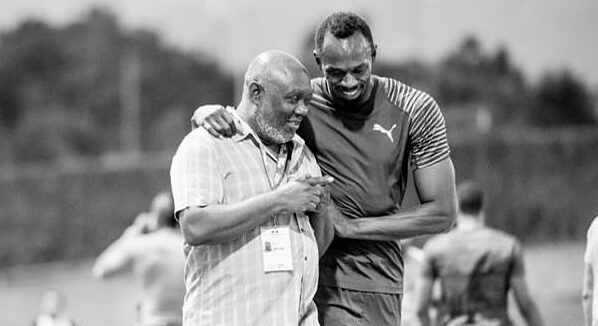

A few weeks ago, Jamaican track and field legend, the fourth-fastest man in history, made waves with a bold statement about the Jamaican track system. He declared, “My kids are not running for Jamaica. Not running for Jamaica. Sorry to say that — but it’s just facts.” This wasn’t just a random comment; the track sensation, who has run the 100m under 10 seconds a record 97 times, knows a thing or two about the sport. Despite being one of the best sprinters of his generation, Asafa Powell never won an individual Olympic gold, and his frustration with the system is clear. But at the same time, Powell’s comment got a lot of attention and sparked debate online.
Many fans were quick to bash him, but when you take a closer look, his statement isn’t just about personal frustration. “Whenever I post videos of my kids doing sports or track, people are always like, ‘Yo, the future looks good,’” Powell said. He went on to point out that his children, Avani and Liam, have Canadian and Ghanaian roots through his wife, Alyshia, which means they have options beyond Jamaica if they choose to pursue athletics. But it’s clear that Powell feels the Jamaican track system isn’t the best place for his children to grow and succeed. Glen Mills, who coached Usain Bolt shares Powell’s concerns.
ADVERTISEMENT
Article continues below this ad

During his interview with Television Jamaica, Mills expressed support for Powell’s anger about the Jamaican track and field’s current state. Mills stated that athletes who qualify need a proper framework to request grantor support. Mills observed that Jamaican athletes dedicate themselves to training, yet they lack the necessary resources to succeed internationally. According to Mills, the majority of trainees will not succeed at the international level, thus requiring an improved system.
Mills didn’t just stop at pointing out the problems; he also offered a solution. He suggested creating a financial support system for athletes—a development grant, not a salary, but enough to give athletes the financial stability to focus on their training. “If we create a structure and an athlete can see what is available within this structure, it will give them the option to say, ‘Well, I think I’m good enough to, after a certain time, use this to get to this level,’” Mills explained. His idea was to give athletes a clear path, with financial backing to help them reach their potential.
One of the biggest points Mills made was about Jamaica’s missed opportunity to market its track and field talent. “We are the only country, outside of America, who has ever had the fastest man and the fastest woman in the world,” he said, referring to Usain Bolt and Elaine Thompson-Herah. Yet, despite this incredible achievement, Jamaica has not done enough to capitalize on its top athletes. Mills believes that if the country could better leverage its world-class sprinters, it could attract sponsorships and funding to support a more sustainable system. “The private sector would contribute,” Mills added, emphasizing that marketing Jamaica’s track talent could help raise the money needed to create the kind of system Powell and others are calling for.
The statement from Powell together with Mills’ endorsement, reveals a critical issue affecting Jamaica’s track system. But at the same time, Glenn Mills appears dissatisfied with the statement Powell made.
What’s your perspective on:
Is Asafa Powell right to keep his kids from Jamaica's track system, or is he overreacting?
Have an interesting take?
ADVERTISEMENT
Article continues below this ad
Money problems are plaguing Jamaica’s track and field stars
During the same interview, the host mentioned Powell’s statement about blocking his children from the Jamaica track and field competition, which Glen Mills responded with a direct answer. “That’s a bit harsh. I would think that maybe he could have made more of an impact while he was running, to put forward the view that athletes need support, etc., and so on. I don’t think coming at the end of his career like that is going to be interpreted the same way.” Mills seemed unpleased with Powell’s approach to sharing his thoughts because the timing and delivery might not have achieved the desired effect.
Mills recognized that the problems within the track and field system exist, while Powell’s anger towards the system remains valid. Track and field legends, including Elaine Thompson-Herah, have expressed their disappointment about the insufficient support provided to athletes.
Elaine Thompson-Herah has revealed that she has faced financial problems in the track and field system of Jamaica. In a 2022 interview on Asafa Powell’s YouTube channel, she complained that “A lot of countries only have two to five athletes, and they take care of them whether they are performing or not. We have the best, but we do not get anything from it apart from the endorsements we get from the shoe companies or the local corporate sponsors.” She asked herself how she would handle her everyday costs since her sponsorships were ending, and she wondered, “What would I have? How would I survive? How would I pay bills?”
ADVERTISEMENT
Article continues below this ad
Thompson-Herah’s concerns were highlighted when she parted ways with her coach, Shanikie Osbourne, in late 2023. Her management team cited a “breakdown in negotiations” over Osbourne’s compensation package, describing it as “extremely excessive and without any flexibility to negotiate.” Osbourne, however, refuted these claims, stating she was open to negotiation and had only requested a standard 15% coaching fee. These instances underscore the financial challenges faced by Jamaican athletes, even those at the pinnacle of their sport in track and field.
ADVERTISEMENT
ADVERTISEMENT
ADVERTISEMENT
ADVERTISEMENT


"Is Asafa Powell right to keep his kids from Jamaica's track system, or is he overreacting?"